With RSS so mighty today, repeat of emergency is just impossible
“One man Jai Prakash and the RSS stood between dictatorship and democracy”
-Virag Pachpore
Senior BJP leader L K Advani stirred a hornet’s nest last week by raising the issue of emergency. Comparing the present situation to that of pre-emergency days, Advani did not rule out the possibility of emergency-like steps. He possibly tried to target the growing antagonism and intolerance of the non-BJP parties and their co-travellers in the media, but tables were turned on the other side and fingers were pointed at Prime Minister Narendra Modi with speculations that he might resort to such an extreme step.
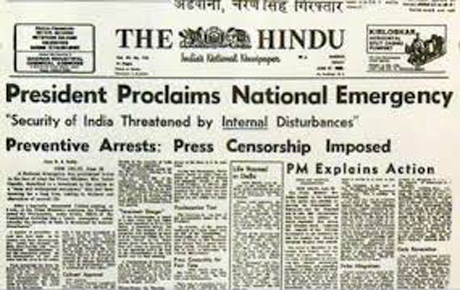
But those who speculated on the return of emergency forgot that the 1975 emergency did not last long because of the one and only one force called Rashtriya Swayamsevak Sangh (RSS). That was 40 years ago. Now in 2015, the RSS has achieved a magnificent growth encompassing almost all the spheres of the public life. In 1975, with its limited might, it could succeed in throwing the tyrannical rule of Indira Gandhi and her infamous coterie. In 2014 it had acquired the strength of electing the party of its choice with full majority to rule this country. Therefore, there is no question of emergency returning in any form in the future. The fears expressed by the media under the cover of Advani’s opinions are unfounded and far from reality. However, one needs to recall the events leading to imposition of emergency and dark years that followed.
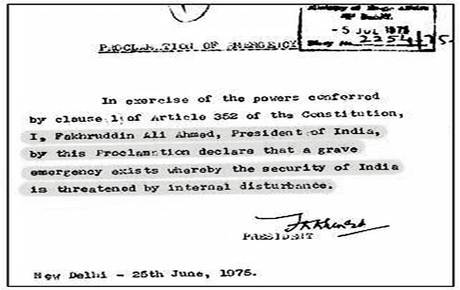
Emergency declared: June 25, 1975 is the most infamous and dark day in the history of independent India. Indira Gandhi, after splitting the original Congress party, headed the other faction called Indira Congress, declared and imposed ‘internal emergency’ for reasons that had no bearing on the internal security of the country. The emergency was imposed to suppress the widespread political unrest and agitations launched against her corrupt government and chief ministers under the leadership of noted Gandhian socialist and sarvodaya leader Jai Prakash Narain alias JP. The Allahabad High Court had ruled that Indira Gandhi had misused her authority to win the Lok Sabha election and thus nullified her election. This verdict came on June 12. On June 24, the Supreme Court too, upheld the HC judgement and disrobed Indira Gandhi of the voting right in the parliament.
This infuriated the Prime Minister and accepting the advice of her coterie that included Siddharth Sanakr Ray, Sanjay Gandhi, V C Shukla etc. she decided to impose emergency. The draft of the proclamation prepared by S S Ray was taken personally to then President Fakruddin Ali Ahmad and he was made to sign. Indira Gandhi, instead of bowing to the verdict of the High Court, thus decided to continue in power by imposing emergency.
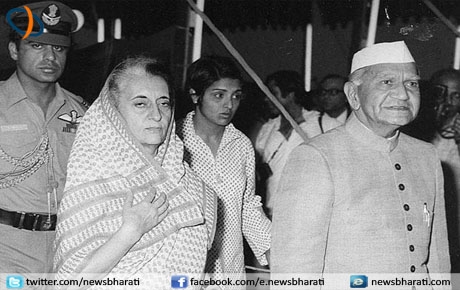
On June 26, 1975, she addressed the nation on All India Radio (TV had no network then). In her very brief address she said, “The President has proclaimed Emergency and there is nothing to panic about”.
The Indian democracy thus was made to stand subverted by the Congress Party Prime Minister Indira Gandhi pushing India into the darkest days till the 1977 elections. Thousands of activists of Rashtriya Swayamsevak Sangh (RSS), Jamat-e-Islami, Anand Marg and leaders of various political parties including Jan Sangh, Socialist Party, Congress (O), Bharatiya Krandi Dal etc. were put behind the bars across the country. Censorship was imposed on the media so that the truth could be suppressed from the people. Judiciary was forced to be ‘committed’ to one person. Human rights including fundamental rights guaranteed by the Constitution were suspended. Indira did not spare the ‘Young Turks’ like Chandrasekhar in her party who voiced any opposition to her. Police were given the free hand to arrest anyone they suspected so also the political goons of the Congress (I) to exercise their heavy arm tactics to break any opposition to Indira Gandhi.
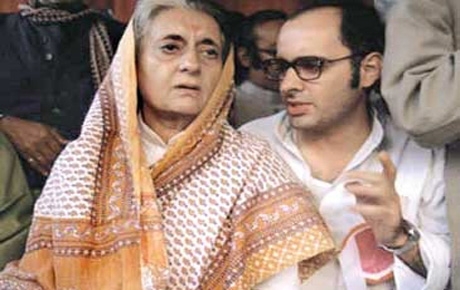
Prime Minister Narendra Modi described this period in the most appropriate words: “At midnight on June 25, 1975 the Emergency was imposed thus beginning one of India’s darkest periods when a political class full of arrogance and intoxicated with power preferred to destroy the nation’s democratic fabric rather than resign when their continuing in office became untenable. ...Who can forget the brutal manner in which personal freedom was trampled over? Who can forget the blatant misuse of MISA to target political opponents? Can one forget the lockouts on media houses? How can we not remember the determined struggle of lakhs of people across the nation for 19 long months?”
Attempt to discredit RSS: We are now 40 years away from that unfortunate event. There is a vast literature written on Emergency and its effects and after-effects. But hardly any honest, impartial writer had ever credited that organization which had the lion’s share in forcing Indira to withdraw emergency and restore democracy in India. Yes, I am talking of Rashtriya Swayamsevak Sangh (RSS). The exemplary courage displayed and heroic role the RSS swayamsevaks played in this ‘battle of nerves’ as the then RSS Chief Balasaheb Devras used to say, deserved better mention in the literature on emergency. But, those who are enjoying the freedom of expression today including freedom to criticise the RSS, have not shown this magnanimity of recognizing its contribution!
Twenty years after 1975, the Times of India Banguluru ran a series on emergency under the caption Emergency Remembered in which the paper published 11 articles of noted columnists but hardly anybody recognized the contribution of RSS in the struggle against emergency. Not only this Dr Usha Mehta wrote a book on emergency in 2005 but did not mention the role RSS played in restoring democracy.
However, The Economist of London wrote: “The underground campaign against Mrs Gandhi claims to be the only non-left wing revolutionary force in the world, disavowing both bloodshed and class struggle. Indeed, it might even be called right wing since it is dominated by the Hindu communalist party, Jan Sangh and its ‘cultural’ (some say paramilitary) affiliate the RSS. But its platform at the moment has only one non-ideological plank; to bring democracy back to India. The ground troops of this operation (the underground movement), consist of tens of thousands of cadres who are organized to the village level into four men cells. Most of them are RSS regulars, though more and more new young recruits are coming in. The other underground parties which started out as partners in the underground have effectively abandoned the field to Jan Sangh and RSS.”
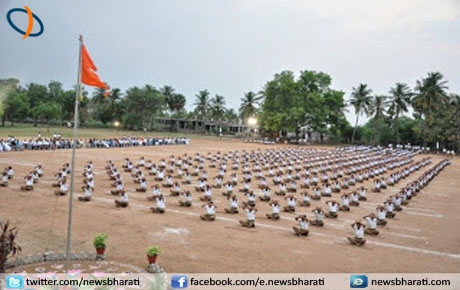
RSS the main target: The main target of Indira was not the political parties and their leaders but RSS because she believed that it was RSS that provided all the logistic support to the movement launched by JP in Bihar and Gujarat. Therefore, even before emergency was declared, she was planning to ban RSS. In January 1975, S S Ray had prepared a draft to ban RSS and sent that to Indira Gandhi. But somehow that was leaked by the media and the plan was postponed. The emergency was then used to crush the RSS.
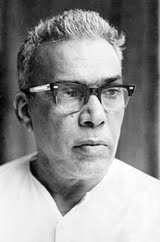
Soon after the emergency was declared large number of RSS leaders and cadres were arrested. The then RSS Chief Balasaheb Devras was arrested at Nagpur railway station and incarcerated in Yerwada Jail near Pune. The jails of the country were flooded with RSS swayamsevaks. According to “The People Versus Emergecy: A saga of Struggle” the number of RSS swayamsevaks detained under MISA was 23015 including 22938 male and 77 female activists. The number of RSS activists arrested for offering satyagraha during emergency was 44965 while only 9655 people of other parties offered satyagraha.
The strength of RSS: The capacity and strength of RSS can be gauged from the confession of Indira Gandhi. In spite of all the efforts to suppress the RSS Indira Gandhi had to admit, “We were not able to capture even 10 per cent of the RSS workers. They all have gone underground and the RSS did not disperse even after the ban, on the contrary it was striking roots in new areas like Kerala”. (The People Versus Emergency: A Saga of Struggle, 1991, pg 21)
Editor of Modern Review M C Subramaniam writes: “Among the groups which carried on this work with heroic persistence the RSS group stands out for its special mention. In organizing satyagraha, in maintaining the all-India communication network, in quietly collecting money to finance the movement, in arranging distribution of literature without any bottleneck and in offering help to fellow prisoners even of other parties and other faiths, they proved that they constitute the nearest answer to Swami Vivekananda’s call for an army of sanyasins to take up social and political work in this country. They are a constructive force who has won the admiration of fellow political workers and respect of even their erstwhile opponents.” (Ibid)
Dr Shivram Karanth said: “When elections were announced the one anxiety that filled my mind was , who are the persons who will carry the message of freedom to the people and make them aware of the things at stake? The workers of RSS came forward in thousands and my anciety was set at rest. Even prior to elections the main burden of the struggle was borne by them. It is they who had kept up people’s morale. More than 80 per cent of the fighting cadres had been drawn from the RSS. I have personally seen thousands of their youngmen solely inspired by a spirit of idealism, without any desire or expectation in return, plunging into the struggle. Often they had nothing to eat, no place to rest, but their zeal remained unabated.” (Ibid)
The Satyagraha and RSS: The RSS defied the ban and offered satyagraha. It was a great irony that those who claimed their inheritance from Gandhi and his values, openly defiled them while the RSS that was accused of violence successfully adhered to the Gandhian path of Satyagraha. Thousands of RSS swayamsevaks offered satyagaraha against emergency, distributed anti-emergency literature to the people, and collected funds to support the families of those who were behind the bars.
The RSS is not interested in political power. It believes that an aware and organized people’s power is required to restrain the political power going astray. So, the Sangh leadership accepted the responsibility to protect and restore democracy. Thus, opposing the dictatorship of the Emergency became the natural duty of the RSS. RSS did not confine itself to getting the ban lifted but took upon it the herculean task of restoring the democratic polity. It also even rejected a conditional proposal from Indira Gandhi on lifting the ban. The restoration of democracy was considered of utmost importance over getting the ban on RSS lifted. The 1977 elections were thus viewed as the best available opportunity for this. With the initiative of Sangh and guidance of JP, the non-Congress opposition parties came together forming Janata Party and the RSS threw its weight behind this party, got their leaders elected and defeated Indira, her son Sanjay and her Congress party.
The RSS planned a stayagraha from Novemebr 14, 1975 to January 14, 1976 demanding removal of emergency and restoration of democracy; lifting press censorship; releasing all the arrested leaders and lifting the ban on RSS. The response to RSS satyagraha was tremendous. Over 1.5 lakh people offered satyagraha at 5349 places. Of them 80 thousand were RSS swayamsevaks. 44965 of them were arrested under DIR and MISA. The arrested included 2424 ladies also. 87 RSS swayasmevaks were martyred during the emergency.
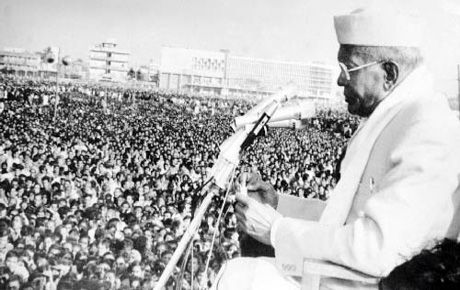
With the RSS initiative the Lok Sangharsh Samiti was formed to carry out satyagraha movement. Prominent leaders including Ravindra Verma, S M Joshi, N G Gorey, Karpuri THakur, Digvijay Narayan Singh, Surendra Mohan, Mohan Dharia, Era Chezian, George Fernandes, and M M Thomasm Sarvodaya leaders, Subramaniam Swamy, Makrand Desai and many others were associated with the Samiti. RSS Sarkarywah the late Madhavrao Muley, Dattopant Thengdi, Bhaurao Devras, Moropant Pinglay, Dr Aba Thatte, Rajju Bhayya, Chamanlal, Kidarnath Sahani, Ramb hau Godbole, Sundarsingh Bhandari, Uttamrao Patil, Jagannathrao Joshi, Anantrrao Gokhale and Madhukar Limaye and thousand other pracharaks were guiding the satyagraha movement.
The elections are announced: Based on the intelligence reports Indira Gandhi declared on January 18, 1977 that general elections would be held in March. Minimum preparatory period was granted to the political opponents so that they hardly get the time to regroup and give a tough fight. Leaders of political parties were released, restrictions were removed and censorship on the press was loosened.
The four parties – Congress (O), Jan Sangh, Socialist Party and BKD of Charan Singh merged to form Janata Party. Senior Congress leader Babu Jagjivan Ram too left the Congress and formed ‘Congress for Democracy’ joining hands with the Janta Party. Nandini Satpathi and H N Bahuguna too joined Babu Jagjivan Ram. The RSS, as stated earlier, threw its weight behind this new party and worked hard during the elections. That was the first election when RSS officially canvassed for any political party. 2014 was the next such instance.
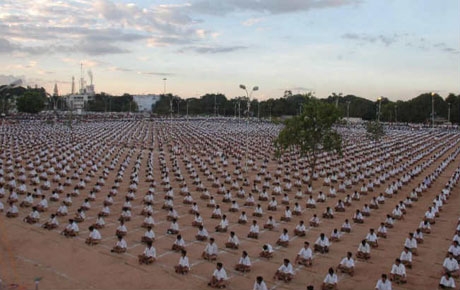
The results of the elections were declared. Indira Gandhi and her Congress (I) was defeated and ousted from the power. She lifted the emergency and ban on RSS and other organizations before resigning. The new Janata Government under Morarji Desai removed the Constitutional amendments that could empower any future government to impose emergency again. Thus, the RSS won its battle and restored democracy in the country. Those who now enjoy freedom of expression, freedom of speech etc. should be thankful to those thousands of RSS cadres who sacrificed their lives, families and everything so that we can live in free, fearless and truly democratic atmosphere.
The third RSS Sarsanghchalak Balasaheb Devras aptly summarised the role RSS played in this struggle against emergency. Regarding a World War II incident involving Hitler and his army it is said: “One man Churchill and 20 miles of English channel stood between Hitler and his victory”. Similarly regarding emergency Devras said: “One man Jai Prakash and the RSS stood between the dictatorship and democracy”.
The future events only endorsed how prophetic Devras was!
